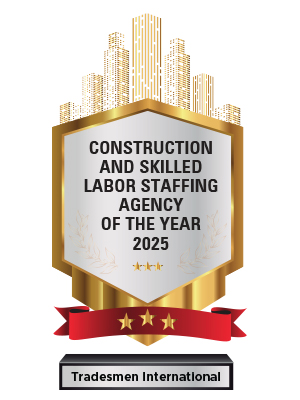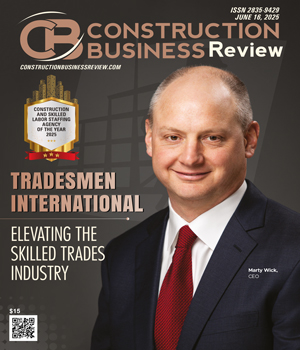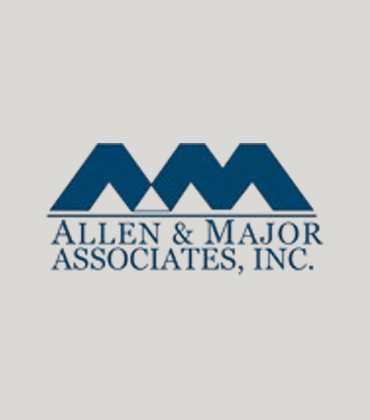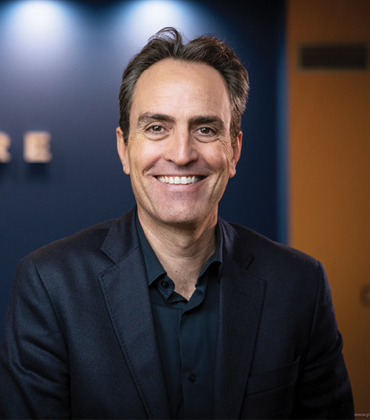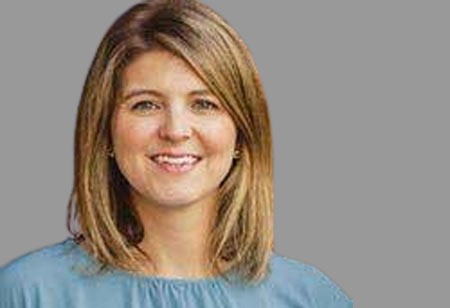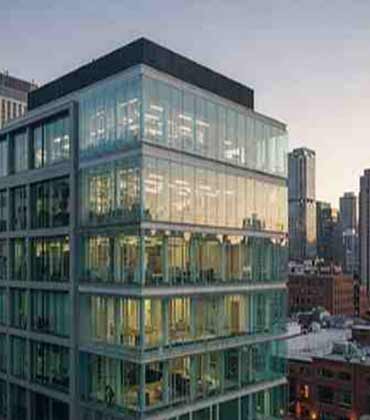Thank you for Subscribing to Construction Business Review Weekly Brief
In the construction and manufacturing industries, skilled labor is the foundation upon which every project is built. Yet, maintaining a qualified workforce has long been one of the biggest challenges for contractors, manufacturers, and industrial firms alike. The cyclical nature of construction projects, fluctuating demand, and the ever-growing skills gap make it difficult for businesses to keep operations running efficiently without overextending their budgets. For more than three decades, Tradesmen International, LLC has been solving this problem by providing a flexible, highly skilled workforce on demand. Whether a contractor needs specialized tradespeople for a commercial high-rise project or a manufacturing plant requires additional workers to meet a production surge, Tradesmen ensures that businesses can scale their workforce without the risks associated with traditional hiring. At the heart of the company’s success is a deep commitment to the well-being of its craft workers. According to CEO Marty Wick, this focus is what truly sets Tradesmen apart. He emphasizes, “We are not just about placing workers on jobs but about ensuring they are respected, paid fairly, kept safe, and provided with the best opportunities in the industry.” That dedication has not gone unnoticed. Tradesmen was ranked sixth on The Indeed 2024 Work Wellbeing 100 list, an award based entirely on worker feedback. Wick sees this recognition as proof that the company is doing right by its people. A Workforce Strategy Built for Efficiency One of the most significant advantages Tradesmen brings to the table is its CORE+Flex labor strategy, a model that allows companies to adapt to fluctuating demand without the inefficiencies of hiring and layoffs. Instead of maintaining a bloated payroll during slow periods, businesses can keep a lean core workforce while tapping into Tradesmen’s network of skilled craft workers when additional hands are needed. This approach ensures that companies remain cost-efficient, avoiding the financial strain of maintaining excess staff while still having access to qualified workers during peak demand. Wick explains that workforce needs change frequently, sometimes even on a weekly basis. The CORE+Flex model allows companies to bring in highly skilled talent exactly when needed and then scale down responsibly when workloads decrease. The result is a more sustainable workforce that prevents costly project delays and budget overruns.
Top Land Surveying Consulting Firm 2025
In land surveying, precision and timeliness are non-negotiable. Even minor delays can cause missed filings, disrupt construction schedules, and lead to unplanned expenses. As the foundation for every successful project, surveying must be executed flawlessly from the outset. Clients need teams that can navigate tight deadlines and shifting priorities without compromising accuracy. Delivering at this level requires not just technical expertise, but also proven systems, proactive communication, and meticulous attention to every detail. That’s exactly what Allen & Major Associates (A&M) delivers. Founded in 1971 as a startup, the company has grown into a leading multidisciplinary firm specializing in land surveying, civil engineering, and landscape architecture. What sets A&M apart is the responsiveness and dedication of its 40-person team—professional engineers, landscape architects, land surveyors, and support specialists— who understand that clients need a team that moves fast, communicates clearly, and adapts to change. At A&M, every call is answered, and every client is kept informed at every stage. Real-time updates and proactive schedule adjustments ensure that projects stay on track, no matter what challenges arise. For A&M, communication isn’t just part of the service—it’s a key element of their competitive edge. “Every successful project starts with a solid understanding of the land, and that’s where we come in. We bring the precision, foresight, and collaboration that let the rest of the team move forward with confidence,” says Andrew Ruggles, Director of Land Survey.
Fire-rated Glass Systems Manufacturer of the Year 2025
Tecfire USA is part of the Tecfire Group, a global leader in fire-rated glass systems with a growing presence across North America. Although the U.S. division is relatively young—founded just two years ago—Tecfire’s roots trace back to 1985 in Spain. This year marks the company’s 40th anniversary of innovation and excellence. Over the past four decades, Tecfire has built a global reputation for delivering high-performance fire-rated glass solutions, with a presence in more than 50 countries across four continents. Serving over 4,000 clients and contributing to more than 5,000 awarded projects “representing nearly 3 million square feet of installed systems” Tecfires portfolio includes iconic sites such as the Louvre Museum and Yas Marina in Abu Dhabi, major airports across Europe and the Middle East, and corporate stores for brands like Apple, and European headquarters for Coca-Cola, and MasterCard. Today, Tecfire is making its mark in the United States, with projects at New York University, Florida State University, the University of Texas, hospitals in New Jersey, Indiana, and Hawaii, as well as numerous high schools, elementary schools, office buildings, and museums spanning from the East Coast to Los Angeles. Tecfire offers a comprehensive range of systems, including doors, windows, custom glass solutions, aluminum framing systems, glass partitions, and stairwell panels. The company’s strength lies in both its broad portfolio and its meticulous craftsmanship. Unlike many competitors who rely on third-party components, Tecfire designs, tests, and certifies its systems entirely in-house—ensuring full compliance with international and local fire codes and delivering unmatched performance. “At Tecfire, we empower architects and builders to create safer, more sustainable spaces by combining innovative fire-rated glass systems with cutting-edge design,” says Jeremy Zimmerman, Managing Director of Tecfire USA. Among Tecfire’s most notable innovations is the world’s only fire-rated pivot door, offering an elegant, modern aesthetic without compromising life-saving functionality. In addition, Tecfire’s true aluminum framing systems give architects the aesthetic versatility they seek—with an array of finish options. While many manufacturers use steel frames clad in aluminum, Tecfire provides pure aluminum framing that is lighter, sleeker, and more refined. With both narrow and wide frame profiles available, designers have the freedom to choose minimalist, transparency-focused aesthetics or more traditional framing to complement existing architecture. Beyond appearance, Tecfire is distinguished by its commitment to rigorous R&D, an industry-leading engineering team, and a highly customizable approach. The company tailors its solutions to each project, delivering both flexibility and innovation without compromise.
CXO INSIGHTS

Diversity in the World of Construction
Vanessa Vanni, Vice President of Operations/Manufacturing, Spartan Group

Asking Too Much From the Land
Steven Jackson, Director of Land Acquisition, Lennar

Driving Talent Strategy and Operational Excellence
Jared McDonald, Director of Talent Acquisition, Walker Engineering

Engineering Performance Through Strategic Execution
Kristoffer Bjorn Knudsen, Sr. Construction Development Manager, Toll Brothers

Sculpting Spaces, Shaping Lives
James Bruner, Vice President of Land Development, Southwest, AMH
IN FOCUS
Forging the Future of Fire-Rated Glass Systems
The fire-rated glass systems industry is evolving, balancing stringent safety regulations with the growing demand for aesthetically pleasing and functional design elements in modern architecture.
EDITORIAL
Advancing Construction Amid Changing Demands
Together, these specialized sectors form a powerful triad that supports every stage of construction, from site analysis to final installation. Land surveyors provide critical spatial intelligence using advanced tools such as drones, LiDAR and GIS technology, ensuring precise groundwork and regulatory alignment. Fire-rated glass manufacturers supply safety-driven, design-conscious materials that meet modern code requirements while supporting architectural intent. Construction staffing agencies bridge the labor gap by delivering trained professionals ready to install complex systems with accuracy and efficiency. By aligning their expertise, these sectors help reduce delays, elevate project quality and meet the demands of an increasingly complex built environment.
This edition of Construction Business Review explores how specialized sectors are driving transformation in construction by aligning expertise to meet modern demands. It features insights from Steven Jackson, director of land acquisition at Lennar, who emphasizes that maximizing lot yield does not always maximize profit, and developers must rigorously evaluate the true financial impact of each added unit. Vanessa Vanni, vice president of operations/manufacturing at Spartan Group, underscores that cultivating culturally diverse teams, supported by empathy and emotional intelligence, is essential to building cohesive, high-performing crews that drive innovation and productivity in the construction industry.
The magazine also features Tradesmen International, a leading provider of skilled labor solutions for construction, manufacturing and industrial sectors, helping businesses efficiently meet workforce demands through flexible staffing and advanced technology
We hope this edition provides actionable insights and strategic direction to help you navigate the evolving construction landscape with greater confidence and foresight.

